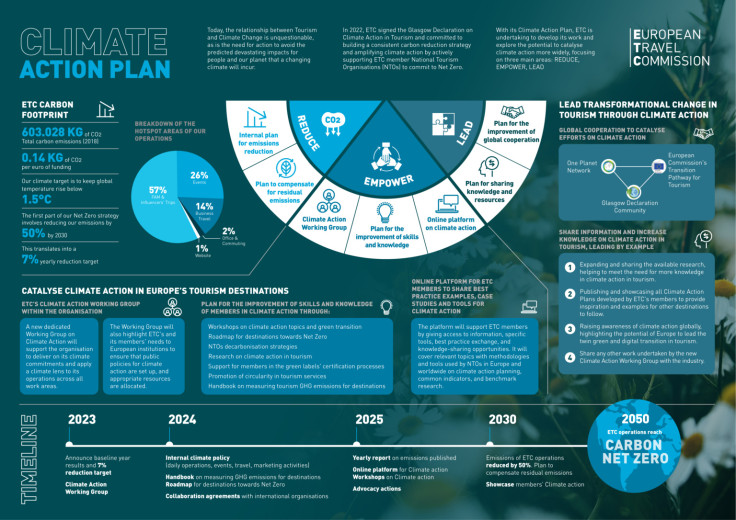European Travel Commission to cut down emissions by 50% by 2030
The detailed Climate Action Plan underlines the ETC's agenda of making the plan fully operational by 2030. Earlier in May 2022, the non-profit organisation committed to such a plan at the Glasgow COP26 conference.

Recently, two major changes have been announced by the European Travel Commission (ETC) – the appointment of Miguel Sanz from the Spanish National Tourism Organisation as the ETC President and the announcement of the ETC Climate Action Plan.
The detailed Climate Action Plan launched this month underlines the ETC's agenda of making the plan fully operational by 2030. Earlier in May 2022, the ETC committed to such a plan at the Glasgow COP26 conference. This is in line with the new President's goal of leading this 35 National Tourism Organisations alliance towards sustainability and inclusivity.
Miguel Sanz comes with a decade and a half of experience in the tourism industry which is likely to help in this process. The organisation elected him for the position at its 105th general meeting that happened in Tallinn, Estonia.
Sanz with his team of 300 tourism industry workers located in 33 offices spread over 25 countries will oversee the 2030 climate action plan. His previous experience in recovering the Spanish tourism industry from the pandemic led slowdown to pre-pandemic level growth will help in the process.
The goal is to maintain Europe as a key tourism destination and achieve the best zero target of the climate action plan which aims to reduce emissions to 50 per cent by 2030.
European tourism faces a great opportunity to emerge as a front-runner in sustainability and inclusivity. We must ensure that tourism has a stronger voice in Europe and the EU, and harness its power to benefit European businesses and communities. Bringing together all European destinations, ETC has a central role in deepening the European brand by promoting the continents' values of freedom and diversity and shaping a more responsible future for the tourism industry.
The ETC Climate Action Plan
The European Travel Commission formally launched its Climate Action Plan developed with the help of the Travel Foundation in May 2023 as per its declaration in Glasgow last year. Travel Foundation is a well-known organisation in the field of sustainable tourism.
The plan takes cognisance of the climate action urgency and pledges to support all members towards its individual net zero goals. It also declared that its own operational emission will be halved by 2030.

The European Travel Commission has reiterated its commitment to the Glasgow declaration through this plan which underlines the link between climate change and tourism, and why the tourism industry needs to act provocatively to tackle this.
It highlighted climate action as a responsibility and an opportunity for the tourism industry. With proper action, the tourism industry can lead the way in sustainable business, by protecting the natural and cultural heritage of the area and providing a unique travel experience.
The plan was formally launched by Miguel Sanz's predecessor and former ETC President Luís Araújo who played an important role in drawing the 2030 strategy.
Addressing the challenges of climate change, building a more resilient and regenerative sector, and restoring and revitalising destination resources should be a priority and responsibility for all tourism stakeholders. With this comprehensive plan, ETC not only strives to achieve carbon neutrality in its operations but also to empower ETC members to take bold climate action and inspire the industry towards impactful initiatives.
It was launched in Estonia's Tallinn which is the Green Capital of Europe at present, because of its green innovation and sustainable governance initiatives along with its biodiversity plan.
Key Climate Action Plans
The ETC is focusing on fulfilling the net zero target by 2050 and for this it will start by reducing its operational emissions from activities like events, FAM and influencers' trips, and business travels. By controlling these activities it is trying to reduce its carbon footprint by 50 per cent as these four areas form its core emission hotspots. The target is to reduce emissions by 7 per cent every year
The European Travel Commission plans to act as a stakeholder for all tourism organisations in Europe and help in their green transition process through collaboration, cooperation and technical support. For this purpose, the non-profit organisation will set up a Climate Action Working Group.
As part of the Climate Action Plan ETC will set up an online forum for smooth interaction and knowledge sharing between the member states. Case studies, best practice examples and a climate change tool kit are some of the things that will be available here.
Lastly, the ETC will work towards enhancing the skills required for this Climate Action Plan.
As the organisation is at the helm of private and public tourism networks it seeks to drive the agency of net zero and green innovation in Europe. It wants to promote the green innovation concept and drive awareness towards tourism sustainability across the world.
© Copyright IBTimes 2025. All rights reserved.






















